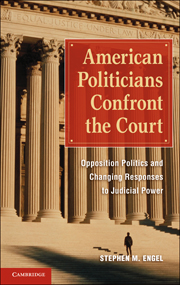 American Politicians Confront the Court
American Politicians Confront the Court Book contents
- Frontmatter
- Contents
- Acknowledgments
- Introduction
- PART I POLITICAL DEVELOPMENT AND ELECTED-BRANCH RELATIONS WITH THE JUDICIARY
- 1 Beyond the Countermajoritarian Difficulty
- 2 A Developmental Theory of Politicians' Confrontations with Judicial Authority
- PART II HOSTILITY TO JUDICIAL AUTHORITY AND THE POLITICAL IDIOM OF CIVIC REPUBLICANISM
- PART III HARNESSING JUDICIAL POWER AND THE POLITICAL IDIOM OF LIBERAL PLURALISM
- On the Return of Opposition Illegitimacy and the Prospects for New Development
- Index
- References
1 - Beyond the Countermajoritarian Difficulty
Published online by Cambridge University Press: 05 June 2012
- Frontmatter
- Contents
- Acknowledgments
- Introduction
- PART I POLITICAL DEVELOPMENT AND ELECTED-BRANCH RELATIONS WITH THE JUDICIARY
- 1 Beyond the Countermajoritarian Difficulty
- 2 A Developmental Theory of Politicians' Confrontations with Judicial Authority
- PART II HOSTILITY TO JUDICIAL AUTHORITY AND THE POLITICAL IDIOM OF CIVIC REPUBLICANISM
- PART III HARNESSING JUDICIAL POWER AND THE POLITICAL IDIOM OF LIBERAL PLURALISM
- On the Return of Opposition Illegitimacy and the Prospects for New Development
- Index
- References
Summary
Politicians have challenged the judiciary's legitimate independent authority throughout American history. Yet scholars contend that the judiciary, and particularly the Supreme Court, has become more powerful and secure over time. Nothing in twentieth-century American politics matches how Jeffersonians reined in the judiciary in the early 1800s or what congressional Republicans achieved in the 1860s. Franklin Delano Roosevelt's (FDR's) court-packing plan collapsed and the impeachment and jurisdiction-curbing threats lobbed against the Warren Court went nowhere. Recent attacks notwithstanding, the Court is unfazed; it and has “intensified its political activity” since the mid-twentieth century, and it shows “few signs of reversing course.” Some scholars assert not only that the judiciary reigns supreme in matters of constitutional interpretation but that such supremacy has been deliberately sought and constructed by elected politicians.
It appears that attacks focused on the Court's democratic deficit have become less potent over time even as the polity as a whole has become more democratic. One way to reconcile this paradox is to suggest that judicial aggrandizement has not come at the expense of the elected branches. Political attacks on the federal courts that do not result in undermining judicial power could be a win-win for all sides. Or, a strong judiciary might serve some advantage despite its countermajoritarian potential, and thus that potential needs to be grudgingly accommodated.
- Type
- Chapter
- Information
- American Politicians Confront the CourtOpposition Politics and Changing Responses to Judicial Power, pp. 19 - 42Publisher: Cambridge University PressPrint publication year: 2011


